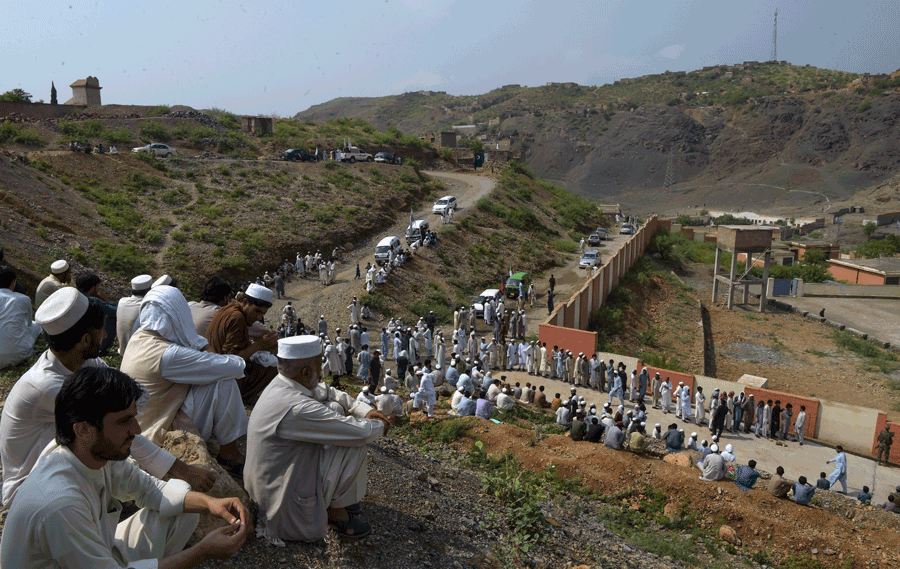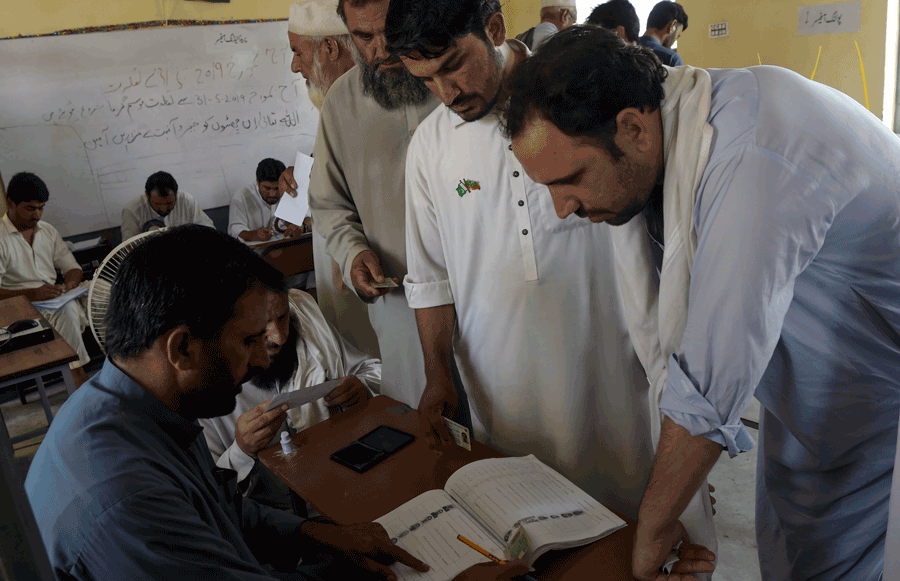The Beginning of a New Era?
The landmark 25th Constitutional Amendment in May 2018, paved the way for the integration of the Federally Administered Tribal Areas (FATA) into Khyber Pakhtunkhwa (KP) province. But it was just the beginning of a long process. The region had long been at the receiving end of terrorist violence and had also suffered as a consequence of the military operations against those elements.
The region has, historically, been used as a buffer zone since the colonial era and later during the Cold War – especially after the Soviet intervention in Afghanistan, when the western powers backed the Jihadi elements and were aligned against the Soviet-backed regime in Afghanistan.
After 9/11, it became a hotbed for jihadis and terrorists groups like Al-Qaeda, the Islamic Movement of Uzbekistan (IMU), the East Turkistan Islamic Movement (ETIM) – all of whom were allies of the Tehreek-e-Taliban Pakistan (TTP).
In the reform and rehabilitation process, the higher judiciary was extended to the region, the local khasadar force inducted in the KP police and more recently, elections for the 16 provincial assembly seats were held, so that the people’s representatives could be part of the legislative process that would affect their lives in the coming years.
Prior to this, the residents of the area were lacking fundamental human rights – including party-based elections. However, the Election Commission of Pakistan (ECP) announced the first-ever party-based provincial assembly elections in the newly merged districts (NMDs) on July 20, 2019.
The elections were previously announced on July 1, but a series of improvised explosive device (IED) attacks on security forces in the first two weeks of June, caused serious concerns regarding the law and order situation. Subsequently, elections were postponed for 19 days.
The election was hailed as historic by the people of the NMDs and they participated in the campaign and voting process with great zeal. The enthusiasm could be gauged from the number of candidates – 297 – that contested the election from general seats in the tribal districts. The list included two women – one each from the Awami National Party (ANP) and the Jamaat-e-Islami (JI). ECP statistics showed that 72 per cent of the contestants (213 out of 297) were independent candidates, while the remaining 84 had tickets of 10 political parties.

KP: Tribesmen line up to cast their vote outside a polling station for the first provincial elections in Jamrud, on July 20, 2019.
According to Qazi Fazlullah, a journalist from Khyber district who works for Geo News, “The reason for [the] majority of the contestants running as independents in the recent elections, is the decades-long alienation of the tribal region and the lack of political rights.”
Fazlullah contends that the “Extension of the Political Parties Order 2002 to former FATA, in 2011, paved the way for a new era. However, due to the worsening law and order situation, this extension, initially, did not promote political activities in the region.” The restoration of peace in the tribal belt after operation Zarb-e-Azb, however, helped in rebuilding the confidence of tribal people, he explains. And since the locals have seen such trying times, they have higher expectations from the ongoing political process. This is reflected in the form of both male and female participation in the election.
The outcome of the election shows that in terms of political parties’ affiliation, no single party has achieved a landslide victory. Six of the constituencies were won by independent candidates, while five were won by the Pakistan Tehreek-e-Insaf (PTI), three by Jamiat Ulema-e-Islam (JUI-F) and one each by the ANP and the JI.
The independent candidates remained dominant on all of the three constituencies of Khyber district (PK-105, PK-106, PK-107) – one each in Orakzai district (PK-110), Mohmand district (PK-104), and North Waziristan district (PK-112). Similarly, the PTI managed to win in two constituencies of Bajaur district (PK-100 and PK-101), and one each in Kurram district (PK-109), North Waziristan district (PK-111) and South Waziristan district (PK-114). The JUI-F candidates got elected from Kurram district (PK-108), South Waziristan district (PK-113) and the Ex-Frontier Regions (PK-115). The JI, meanwhile, won in Bajaur district (PK-102), and the ANP secured its only seat in Mohmand district (PK-103).
Opponents of the ruling PTI criticised it for trying to manipulate the electoral process in the tribal districts, by providing incentives to the people, in one form or another. For instance, the honorarium of tribal elders that was suspended earlier, after Frontier Crimes Regulation (FCR), was abolished. It was restored just before the election, to win their support. This was done despite the fact that the same elders were against the merger of these districts with KP. They demanded either a separate province, or insisted on continuing with the status quo. The strategy fell flat on its face, as the PTI could gain little from extending support to these forces, who have little to no say in the changing political scenario.

Tribesmen interact with an election official in a polling station.
According to a report by the Free and Fair Election Network (FAFEN), the election in the tribal districts was free from any major controversy as far as the quality of the electoral process was concerned. However, the overall voter turnout was 6.3 per cent lower than that of the general election of July 25, 2018. The report says voters were allowed access to most of the polling stations (i.e. 95 per cent). However, security officials stopped voters at five per cent of the polling stations on technical grounds – which were promptly resolved. The report says FAFEN also did not receive any incident in which women were barred from voting.
According to the ECP, there are almost 2.8 million registered voters in the Tribal districts, out of which 1.13 million are female and 1.67 million are male. The total voter turnout was 26.27 per cent; male voter turnout was recorded at 31.42 per cent, while that of female voters was 18.63 per cent. As Compared to the settled districts of KP, this election also shattered a common misperception of a low turnout of women voters in some areas, which can jeopardise election result. However, the results show that women participated in the electoral process in tribal districts as much as the men did. ECP data shows a women voter turnout of 44 per cent in some constituencies, as compared to the minimum requirement of 10 per cent.
Among the constituencies, Kurram-II (PK-109) remained on top in terms of women voter turnout, with 44.5 per cent of the votes cast by females. This was followed by Kurram-I (PK-108) and Orakzai (PK-110) with a female voter turnout of 35 per cent. Similarly, in South Waziristan-I (PK-113) the turnout of women was recorded 29.30 per cent, Ex-Frontier Regions (PK-115) 33.4 per cent and Khyber-I (PK-105) 33.60 per cent.
Nausheen Jamal, one of the FAFEN observers for the election in the tribal districts contends that the female voter turnout could have been much higher if certain issues had been resolved on time. She pointed at a lack of basic facilities in women’s polling stations before election day – women presiding officers spent their entire day without any electricity. Similarly, the polling stations lacked facilities like drinking water and washrooms. She also noted that the women’s polling stations were located at a distance from each other, which raised the issue of accessibility.
Nausheen laments that women voters were not properly educated on the casting votes and this resulted in a sizeable number getting wasted. She further added that many of the women were also reluctant to visit polling stations because of the CCTV cameras installed there, owing to local customs and cultural barriers.
The ECP did not deny the fact that there were issues in the provision of basic facilities at the polling stations. However, the spokesperson of ECP KP, Muhammad Sohail, says the polling staff might have encountered problems in some areas, but the ECP and the local administration tried their best to make sure that the staff was provided with as many facilities as possible. He said that the election process of the tribal districts should not be compared with that of the settled areas, as the former have been hit hard by militancy.
Abdul Lateef Afridi, a prominent lawyer and President of the KP Bar Council, says the election in the tribal districts rejected the very idea that tribal people cannot be part of the democratic process. He said that with this election, the bond between the settled and tribal districts will be further strengthened. He added that the elected representatives of the tribal people will now have a forum where they can discuss and highlight their issues and participate in legislation.
Afridi termed the overall election process as free and fair. He said that the army did not intervene, except in a few areas, from where reservations were drawn. He also applauded the active participation of women, calling it a promising sign for the democratic process in the tribal districts.
The independent candidates were in the lead, he said, due to a lack of political activities in the tribal districts, compared to settled areas. He said that with the political gatherings, rallies, corner meetings, and other activities, political parties will become more powerful in the future and regressive forces would be weakened. However, he added that parties had not provided tickets to deserving candidates, which led them to contest as independents.
Afridi contends that the PTI had won even more seats than expected, as they had not addressed the issues of the people in the tribal areas.
Mehmood Khan, the Chief Minister KP, addressed a press conference on July 22, at the CM House in which talked about the elections. He dismissed the allegations of intervention in the current elections, and said that if there had been any intervention from the provincial government, the results would have been quite different. Khan said that the PTI is still the leading party in the tribal election, and added that some of the PTI members contested as independent candidates, which affected the party’s overall performance. He said that the party will take disciplinary action against those who violated its policy.
On the other hand, all the political parties have started approaching the independents. Shaukat Yousfzai, the provincial Information Minister, visited all the winning independent candidates and invited them to join the PTI. He said that the CM had a meeting with MPA elect, Shafiq Afridi, from Khyber (PK-106), who agreed to join the party and made a formal announcement to that extent. He alleged that some of the parties are even offering money to the winning candidates and that the PTI, however, will not accept any pressure or unfair demands, since the party is already enjoying a two-thirds majority in the provincial assembly.



